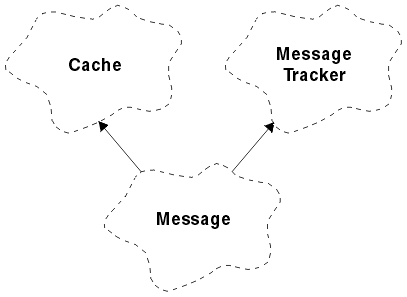- application id data
- Identity information associated with a message. The initial value
is a null string.
- application origin data
- Origin information associated with a message. The initial value is
a null string.
- backout count
- The number of times a message has been tentatively retrieved and
subsequently backed out. The initial value is zero. This
attribute is read-only.
- character set
- Coded Character Set Id. The initial value is MQCCSI_Q_MGR.
The following additional values are possible:
MQCCSI_INHERIT
MQCCSI_EMBEDDED
You can also use a Coded Character Set Id of your choice. For
information about this, see the code page conversion tables in the WebSphere MQ Application Programming Reference
book.
- encoding
- The machine encoding of the message data. The initial value is
MQENC_NATIVE.
- expiry
- A time-dependent quantity that controls how long WebSphere MQ retains an
unretrieved message before discarding it. The initial value is
MQEI_UNLIMITED.
- format
- The name of the format (template) that describes the layout of data in the
buffer. Names longer than eight characters are truncated to eight
characters. Names are always padded with blanks to eight
characters. The initial value is MQFMT_NONE. The following
additional values are possible:
MQFMT_ADMIN
MQFMT_CICS
MQFMT_COMMAND_1
MQFMT_COMMAND_2
MQFMT_DEAD_LETTER_HEADER
MQFMT_DIST_HEADER
MQFMT_EVENT
MQFMT_IMS
MQFMT_IMS_VAR_STRING
MQFMT_MD_EXTENSION
MQFMT_PCF
MQFMT_REF_MSG_HEADER
MQFMT_RF_HEADER
MQFMT_STRING
MQFMT_TRIGGER
MQFMT_WORK_INFO_HEADER
MQFMT_XMIT_Q_HEADER
You can also use an application-specific string of your choice. For
more information about this, see the Format field of the message
descriptor (MQMD) in the WebSphere MQ Application
Programming Reference book.
- message flags
- Segmentation control information. The initial value is
MQMF_SEGMENTATION_INHIBITED. The following additional values are
possible:
MQMF_SEGMENTATION_ALLOWED
MQMF_MSG_IN_GROUP
MQMF_LAST_MSG_IN_GROUP
MQMF_SEGMENT
MQMF_LAST_SEGMENT
MQMF_NONE
This attribute is not supported on z/OS.
- message type
- The broad categorization of a message. The initial value is
MQMT_DATAGRAM. The following additional values are possible:
MQMT_SYSTEM_FIRST
MQMT_SYSTEM_LAST
MQMT_DATAGRAM
MQMT_REQUEST
MQMT_REPLY
MQMT_REPORT
MQMT_APPL_FIRST
MQMT_APPL_LAST
You can also use an application-specific value of your
choice. For more information about this, see the MsgType
field of the message descriptor (MQMD) in the WebSphere MQ
Application Programming Reference book.
- offset
- Offset information. The initial value is zero. This
attribute is not supported on z/OS.
- original length
- The original length of a segmented message. The initial value is
MQOL_UNDEFINED. This attribute is not supported on z/OS.
- persistence
- Indicates that the message is important and must at all times be backed up
using persistent storage. This option implies a performance
penalty. The initial value is MQPER_PERSISTENCE_AS_Q_DEF. The
following additional values are possible:
MQPER_PERSISTENT
MQPER_NOT_PERSISTENT
- priority
- The relative priority for transmission and delivery. Messages of
the same priority are usually delivered in the same sequence as they were
supplied (although there are several criteria that must be satisfied to
guarantee this). The initial value is MQPRI_PRIORITY_AS_Q_DEF.
- put application name
- The name of the application that put a message. The initial value
is a null string.
- put application type
- The type of application that put a message. The initial value is
MQAT_NO_CONTEXT. The following additional values are possible:
MQAT_AIX
MQAT_CICS
MQAT_CICS_BRIDGE
MQAT_DOS
MQAT_IMS
MQAT_IMS_BRIDGE
MQAT_MVS
MQAT_NOTES_AGENT
MQAT_OS2
MQAT_OS390
MQAT_OS400
MQAT_QMGR
MQAT_UNIX
MQAT_WINDOWS
MQAT_WINDOWS_NT
MQAT_XCF
MQAT_DEFAULT
MQAT_UNKNOWN
MQAT_USER_FIRST
MQAT_USER_LAST
You can also use an application-specific string of your choice. For
more information about this, see the PutApplType field of the
message descriptor (MQMD) in the WebSphere MQ Application
Programming Reference book.
- put date
- The date on which a message was put. The initial value is a null
string.
- put time
- The time at which a message was put. The initial value is a null
string.
- reply-to queue manager name
- The name of the queue manager to which any reply should be sent.
The initial value is a null string.
- reply-to queue name
- The name of the queue to which any reply should be sent. The
initial value is a null string.
- report
- Feedback information associated with a message. The initial value
is MQRO_NONE. The following additional values are possible:
MQRO_EXCEPTION
MQRO_EXCEPTION_WITH_DATA
MQRO_EXCEPTION_WITH_FULL_DATA *
MQRO_EXPIRATION
MQRO_EXPIRATION_WITH_DATA
MQRO_EXPIRATION_WITH_FULL_DATA *
MQRO_COA
MQRO_COA_WITH_DATA
MQRO_COA_WITH_FULL_DATA *
MQRO_COD
MQRO_COD_WITH_DATA
MQRO_COD_WITH_FULL_DATA *
MQRO_PAN
MQRO_NAN
MQRO_NEW_MSG_ID
MQRO_NEW_PASS_ID
MQRO_COPY_MSG_ID_TO_CORREL_ID
MQRO_PASS_CORREL_ID
MQRO_DEAD_LETTER_Q
MQRO_DISCARD_MSG
MQRO_DISCARD_MSG
where * indicates values that are not supported on WebSphere MQ
for z/OS.
- sequence number
- Sequence information identifying a message within a group. The
initial value is one. This attribute is not supported on z/OS.
- total message length
- The number of bytes that were available during the most recent attempt to
read a message. This number will be greater than the ImqCache
message length if the last message was truncated, or if the last
message was not read because truncation would have occurred. This
attribute is read-only. The initial value is zero.
This attribute can be useful in any situation involving truncated
messages.
- user id
- A user identity associated with a message. The initial value is a
null string.
